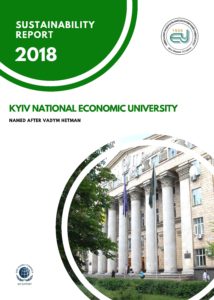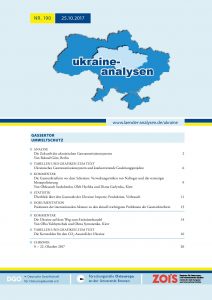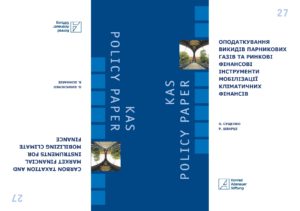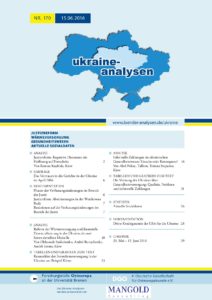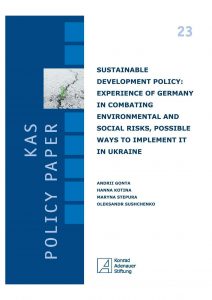Economics and finance of disaster risk reduction and climate change adaptation
Our report identifies political, economic and financial shortages in the EU Green Deal, shining the light on knowledge gaps between the Climate Change Adaptation (CCA) and Disaster Risk Reduction (DRR) communities. We explore concrete actions to eliminate overlaps or conflicting actions within both communities, and counteract fragmentation of knowledge.
Roadmap for a Green Financial Policy in Ukraine under the EU Association Agreement
We are glad to present first research on the topic of establishing a green financial policy in Ukraine, where the main instruments, mechanisms and agents have been explored, important steps on the way to sustainable financial policy and system described.
KNEU Sustainability Report 2019
In 2019 our Center prepared the first Sustainability Report for Kyiv National Economic University named after V. Hetman. This document covers analysis of the major non-financial risks and results for 2014-2017 years.
Center for Blended Value Studies – a Think Tank of Ukraine
Our Center for Blended Value Studies has been recognized by the Working Group for Economic Governance (Germany) as a Think Tank of Ukraine! Thank you all!
The Reform of Natural Gas Market in Ukraine Fails: Governance Risks at NAK “Naftogaz” and Steady Monopolization
The changes of the constituent documents of “Ukrtransgas” and subsequent subordination of this company to the Ministry of Economic Development and Trade could threaten the functioning of the GTS (gas transmission system). It was also a clear evidence of the governance risks importance and their potential impact on the company’s activities and financial performance. Thus, violations of the Principles of Corporate Governance for State-owned Enterprises of the Organization for Economic Cooperation and Development (OECD) could limit also the access to next loans from the World Bank and other financial institutions.
While in Ukraine assessment of the governance risks impact on financial performance of the company starts only to emerge, there is a clear system in the world for assessing such impact on financial performance, the company’s rating.
Carbon taxation and market financial instruments for mobilizing climate finance
The aim of this paper is to elaborate recommendations for politicians, authorities in the area of climate finance accumulation, evaluate financial instruments and their role in mobilization of the necessary financial resources. It is also important to show the shift from voluntary corporate social responsibility (CSR) to the new principles of investing (ESG) and business models in the climate change area and how it affects mobilization of climate finance. Another important goal of this paper is to show the importance of transaction costs, and ways how the accounting, reporting and evaluation of the results of emission reduction projects could reduce existing costs and improve access to the financial market, i.e. to the relatively “cheap” financial resources. We also highlights ways for establishing the necessary infrastructure on the financial market needed to minimize the transaction costs while getting financial resources for the purpose of greenhouse gases reduction (GHG reduction).
Reform of the public utility sector and financial decentralization as two sides of the same medal
Today Ukraine is on the eve of fundamental changes that are long overdue. It`s about the decentralization processes taking place in the sector of public utilities and entire financial system – decentralization of the basic public services supply and the strengthening of the financial capacity of local governments. How are they related and whether they can strengthen each other?
Sustainable development policy: experience of Germany in combating environmental and social risks and possible ways to implement it in Ukraine
Our publication is an analytical report which reveals the essence and stages of development, basic tools of sustainable development policy. The main emphasis is made on financial instruments for combating social and environmental risks, transitioning to a low carbon economy. The paper highlights the experience of development and implementation of the German sustainable development policy, outlines possible ways to use it in Ukraine.


